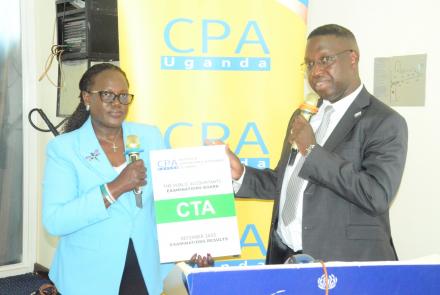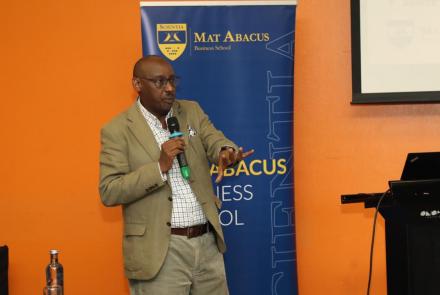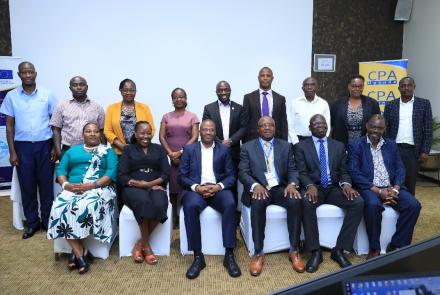By Joan Abaasa
Communications Officer- ICPAU
At the 3rd C-Suite Forum held on 14 May 2025, under the theme Driving Transformative Change in Unprecedented Times, CPA Patrick Ayota, Managing Director of the National Social Security Fund (NSSF), and CPA Prof. Samuel Sejjaaka, Team Leader at MAT ABACUS Business School, shared insights on navigating change and unlocking investment opportunities.
CPA Ayota presented a case study on NSSF’s transformation, reflecting on the Fund’s journey over the past decade. He recounted how, in 2015, the Fund was grappling with the aftermath of governance scandals, a rigid legal framework, and mounting external pressure from liberalisation policies. With staff morale low and customer trust weakened, NSSF operated in a turbulent environment shaped by shifting political and regulatory dynamics.
From these challenges emerged a bold strategy titled Vision 2025. At its core was a simple but powerful goal to make NSSF the provider of choice, regardless of sector liberalisation. The Fund committed to delivering value through speed, efficiency, and relevance.
Looking ahead, NSSF introduced Vision 2035, which aims to expand social security coverage to include informal workers and farmers. The target is to grow membership from 2.3 million to 15 million, maintain high satisfaction rates, and increase the Fund’s value to UGX 50 trillion.
“If we do nothing,” he warned, “the Fund will begin a slow but inevitable decline.”
CPA Ayota also spoke to the broader theme of transformation through the lens of national opportunity. He painted a vibrant picture of Uganda, its natural beauty, rich culture, and rising global profile.
Recalling Winston Churchill’s famous description of Uganda as the “Pearl of Africa,” CPA Ayota stressed this was no exaggeration. In 2024, Uganda was named Africa’s top tourist destination by Bradt Guides and ranked among the world’s most beautiful countries.
Prof. Samuel Sejjaaka also delivered a presentation on the mindset required to lead and thrive in today’s rapidly evolving global environment. He challenged business leaders to abandon outdated models and embrace new thinking, tailored to modern-day realities.
He contextualised leadership using two frameworks: VUCA (Volatility, Uncertainty, Complexity, and Ambiguity) and BANI (Brittle, Anxious, Non-linear, and Incomprehensible).
These models, he explained, reflect a world where rapid technological change, regulatory shifts, rising customer expectations, and global instability render traditional leadership approaches ineffective.
In what he called “The New Normal,” Prof. Sejjaaka stressed that today’s leaders must navigate growing demand, from digital transformation and policy shifts to more vocal and value-driven customers. Success, he said, depends on agility, continuous learning, foresight, execution, and attentive listening.
He also addressed the regulatory and policy changes shaping Uganda’s economy, including national development programmes, evolving tax systems, public service innovations, and the militarisation of infrastructure. These, he noted, must be met with leadership that balances private sector growth with public interest.
Prof. Sejjaaka emphasised the importance of understanding the evolving customer, one that is informed, vocal, self-reliant, and heavily influenced by peer networks.
To stay relevant, he urged businesses to align with customer values and offer innovative, responsive solutions.
Quoting Peter Drucker, he concluded: “The greatest danger in times of turbulence is not the turbulence, it is to act with yesterday’s logic.”
The 3rd C-Suite Forum was organised by the Institute of Certified Public Accountants of Uganda. Held at the Sheraton Kampala Hotel, the Forum attracted over 100 Board members, Chief Executive Officers and Chief Financial Officers from public and private sector organisations.
The C-Suite Forum is organised to foster c-suite synergies, between the Board, CEOs and CFOs, as a strategy for organisational sustainability.
END




